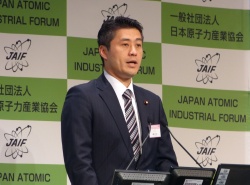Japanese nuclear fuel cycle under review
18 April 2012
Japan is evaluating a wide range of nuclear fuel cycle options as part of the larger review of the future role of nuclear power within energy policy, a government minister told the annaul meeting of the Japan Atomic Industrial Forum.
 |
Goshi Hosono addresses the main assembly of the
Japanese nuclear industry |
Goshi Hosano holds a range of positions in the Japanese government: Minister for the Environment, Minister for the Restoration from and Prevention of Nuclear Accident, and Minister of State for Nuclear Policy and Administration. He explained the reviews of fuel cycle policy during a speech today at JAIF's 45th Annual Conference, being held in Tokyo.
A subcommittee has been established to look at the options for future nuclear fuel cycles that aims to sort out discussion points and organize the data available. These activities will include economic feasibility estimates for the various nuclear fuel cycle options.
The subcommittee will carry out its deliberations in three steps starting with a review of technical options. Five options are being considered, one scenario involving direct disposal of light-water reactor fuel after use, two scenarios where this is reprocessed and with fuel materials recycled as mixed-oxide fuel. Two more scenarios look at the use of fast reactors and fast breeder reactors.
A review of policy options is then to follow which will look at direct disposal of the used fuel, reprocessing of the country's entire stock and a combination of the two.
The last step is to combine the first two reviews, at the same time adding a time axis of mid-to-long term scenarios.
This review will quantify the amount of plutonium and used fuel generated by each option as well as looking at broader impacts such as energy security, the international perspective, and the impacts of the changes resulting from each of the potential policies.
Separately Japan is reviewing its Basic Energy Policy, which may recommend nuclear's contribution to electricity be targeted at either 0%, 20%, 26% or 36% for the medium term.
Hosono used his opportunity of speaking directly to the Japanese nuclear industry to pay tribute to the heroic efforts of workers who dealt with the immediate impacts of the Fukushima accident, saying they commanded his highest respect.
For the longer term the minister emphasised the importance of developing human resources to deal with the decommissioning of Fukushima Daiichi.
Researched and writen
by World Nuclear News